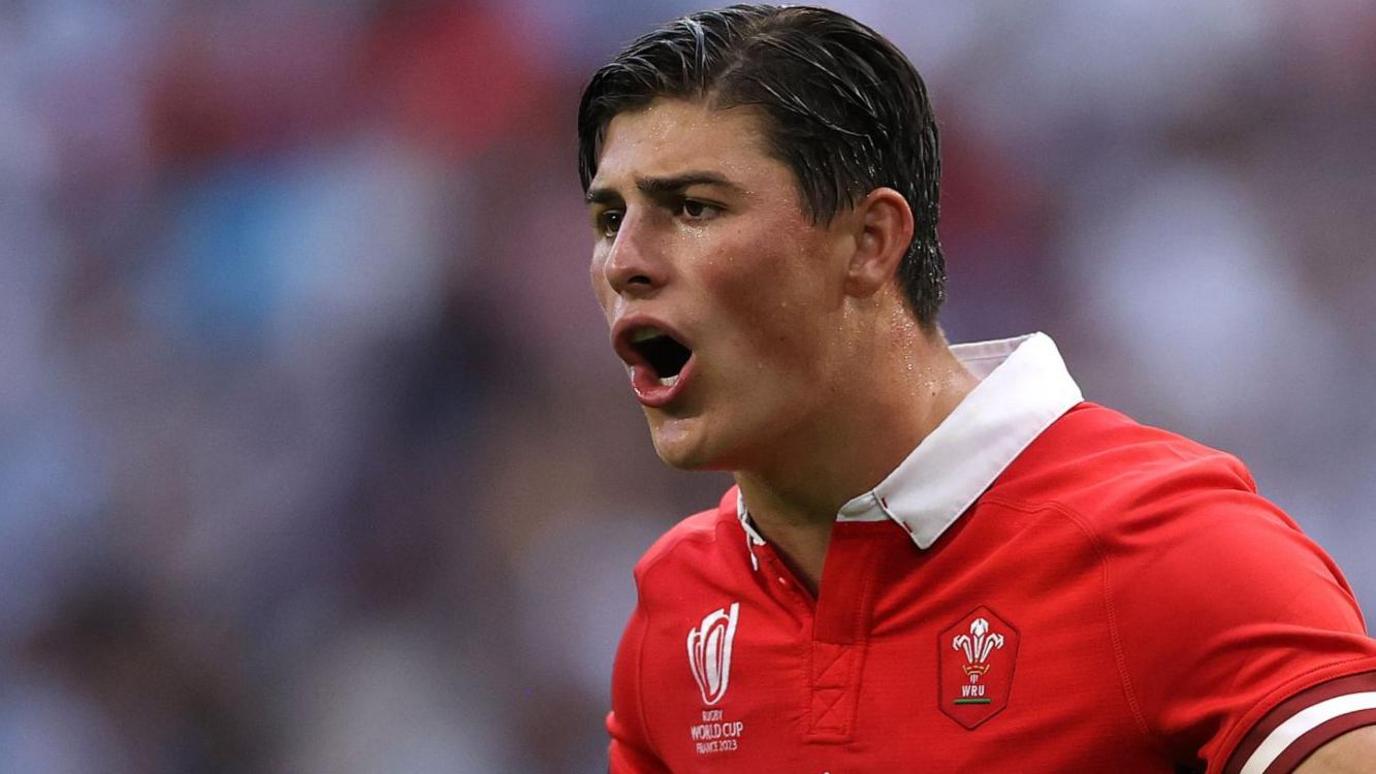What grassroots rugby says about regions shake-up
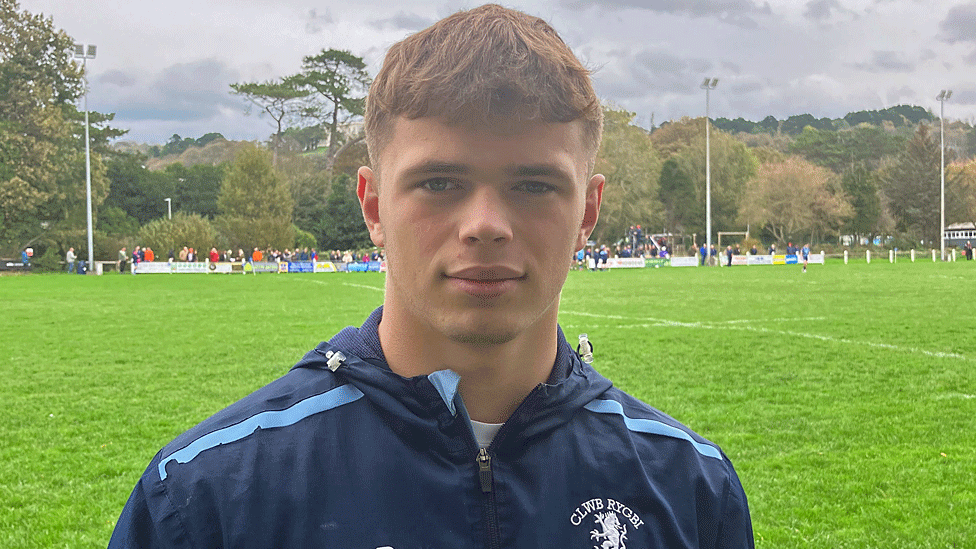
Player Keir Creasey, 17: "I'd like to stay in Wales but there are fewer opportunities here"
- Published
"There's still an awful lot of talent in Welsh rugby and we need to nurture that," said Mike Price, Neath RFC's secretary.
Grassroots rugby clubs have their own concerns as the Welsh Rugby Union (WRU) plan to cut one of the nation's four professional teams.
One club highlighted a "trend" in young talent leaving Wales to train in England, while fans have said allegiances can't be changed.
WRU chairman Richard Collier-Keywood said their plans had been announced following possibly the "biggest consultation... in Welsh sporting history".
He told BBC Radio Wales Breakfast the WRU had considered cutting the number of regional teams to two, but had reconsidered finances after listening to more than 7,000 people who had taken part in its consultation.
That will leave three teams in Cardiff, east Wales and west Wales.
And if the current regions - Cardiff, Dragons, Ospreys and Scarlets - cannot come to a consensus as to how that will be decided - such as a merger - then the WRU will open a tender process for the three licences.
Welsh regions 'relieved and encouraged' despite WRU cut plan
- Attribution
- Published24 October
Welsh rugby aims to halt player-drain to England
- Attribution
- Published25 October
Prior to Friday's announcement, I spoke to clubs across the four regions, starting my journey at Neath, the birthplace of the Welsh Rugby Union in the Castle Hotel in 1881.
The town's famous Gnoll ground, which has witnessed some unforgettable rugby moments in its own long history, is a shadow of its former self.
Neath RFC has won Welsh championships and Welsh cups numerous times during its history.
And touring sides from the Southern Hemisphere, including the All Blacks and Springboks, have played at the Gnoll in front of sell-out crowds.
But as the professional era developed in Wales, fans in Neath were asked to travel further afield and switch their allegiances.
For some, having to support the Swansea-based Ospreys was perhaps palatable as that team competed for honours in Europe.
In a part of the world where rugby allegiances are tribal and local rivalries are bitter, the prospect of perhaps having to travel further - maybe to Llanelli-based Scarlets to watch professional rugby - would quite literally be a bridge too far.
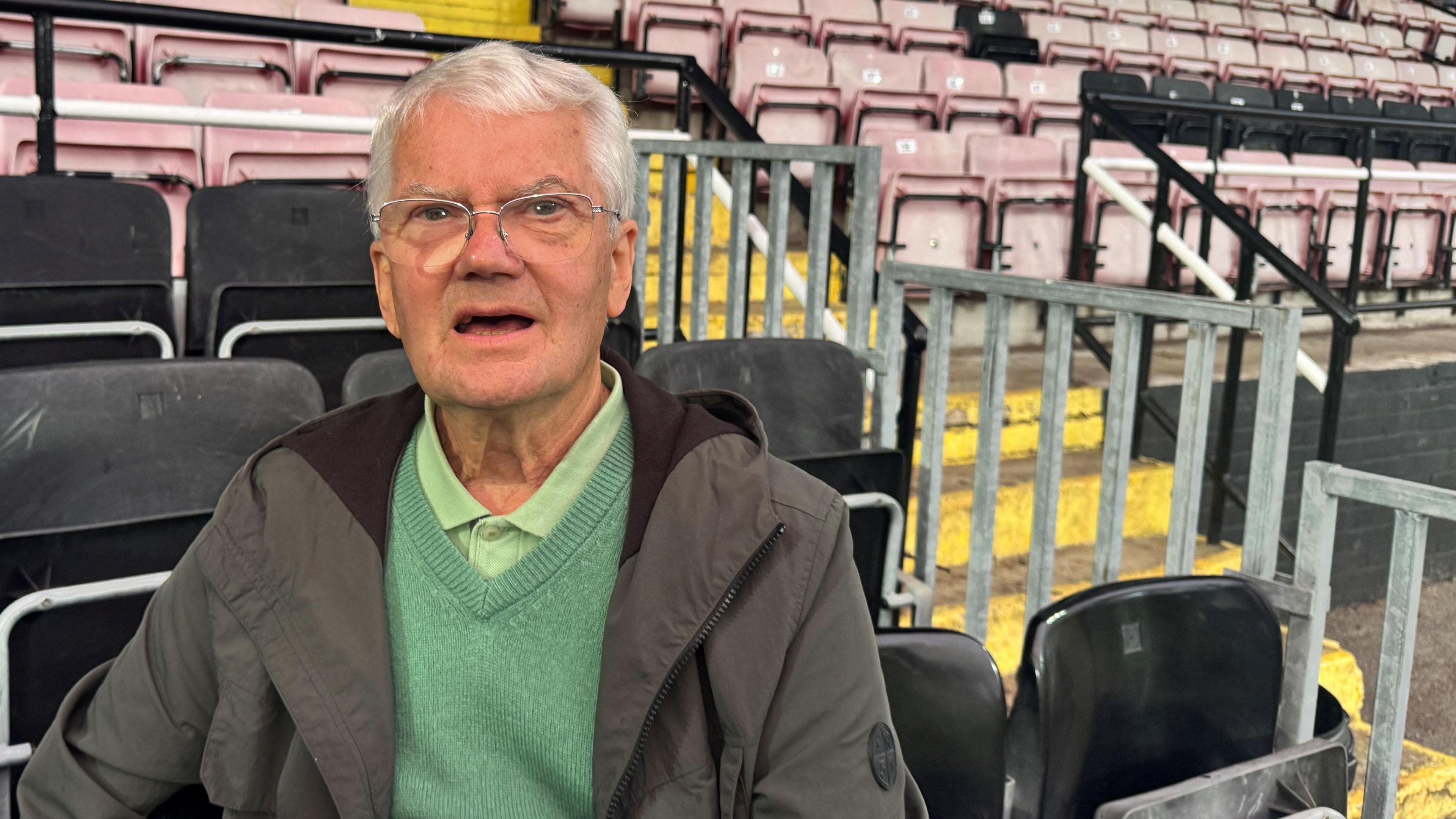
Neath fan Brian Hopkins: "Regional rugby has already robbed clubs like ours of all their cream and talent"
"The Scarlets are our nemesis - our rivals," said Brian Hopkins, a season ticket holder for much of his life.
"Do you think I could wave a Scarlets flag? Just like Pontypridd fans will never follow Cardiff because it's in their nature to support their own club."
He said he "remembers the days" when 6,000 fans would watch top grade rugby at the Gnoll.
"Regional rugby has already robbed clubs like ours of all their cream and talent," he said as he watched a mid-week training session from the terraces with a handful of other dedicated fans.
The WRU's proposals had been rejected by supporters and club officials here, although they acknowledge something has to be done to address the financial and playing crisis in Welsh rugby.
"There's no easy solution and anyone who says that is misguided," said Mike Price, Neath RFC's secretary.
He acknowledged that the club has had "strained relations" with the WRU hierarchy in recent years but the club now seemed content to be competitive in the semi-professional leagues.
"We'll keep on ploughing our own furrow," he said.
"We're determined to succeed and that will always be the way in Neath where rugby still means an awful lot."
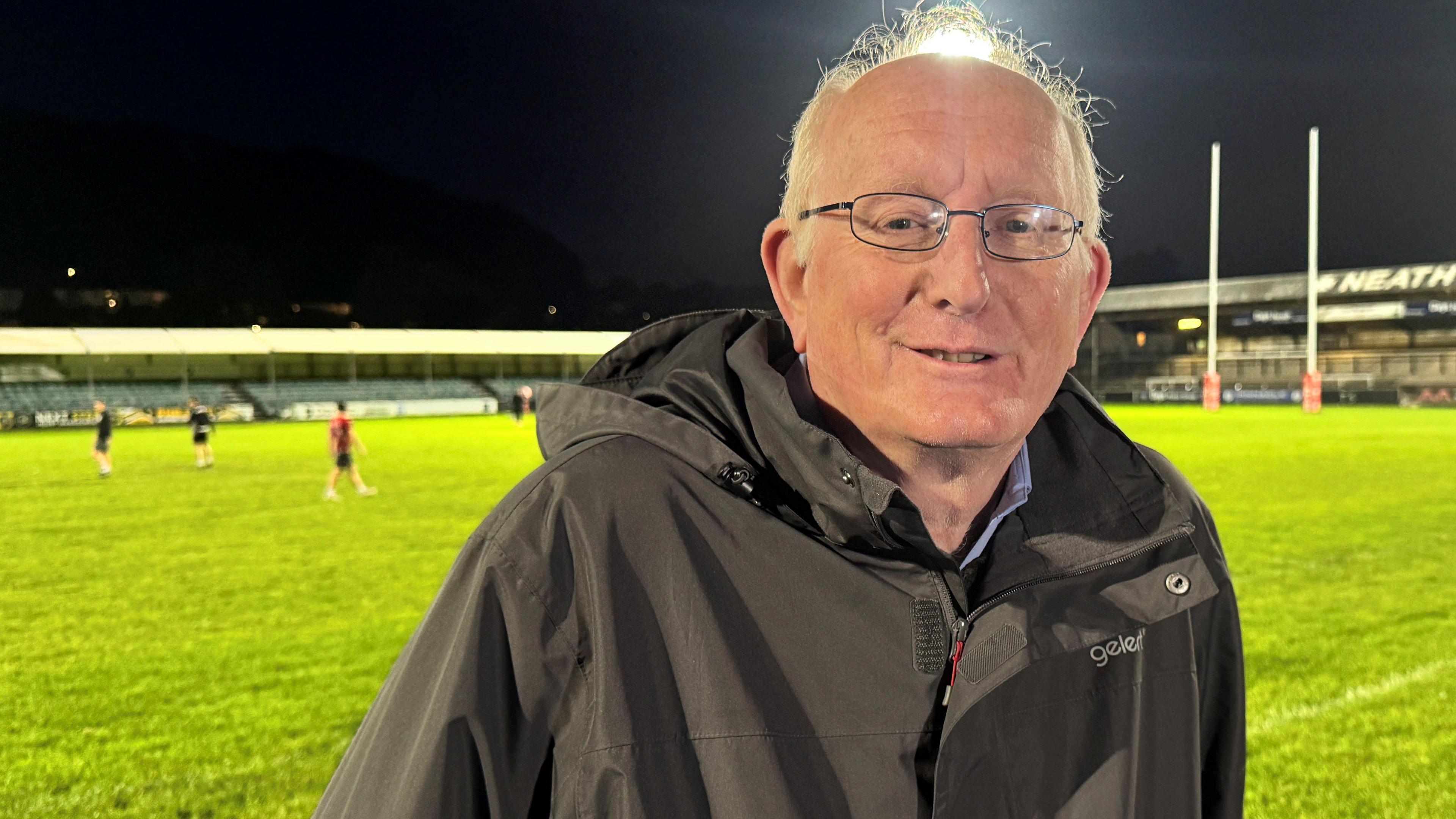
Neath RFC secretary Mike Price: "We're determined to succeed and that will always be the way in Neath where rugby still means an awful lot"
There are 300 rugby clubs in Wales, competing across 30 different leagues and divisions, according to the WRU.
But as you travel increasingly further beyond the South Wales M4 corridor, along which our current four professional sides are based, there's a perception that the WRU's plans for reform don't take into account the needs and opinions of clubs in the wider country.
As I left Neath, heading west, one thing that Mike Price said stuck in my mind.
"There's still an awful lot of talent in Welsh rugby and we need to nurture that."
As a relatively small country without the riches of England or Ireland where Rugby Union is a predominantly well-funded middle class sport, Welsh rugby is still rooted in working class communities where resources are limited.
My next stop was Aberystwyth RFC where a healthy crowd of 200-plus spectators watched a youth league match at a club clearly at the heart of the community.
"Talented young players from clubs like Aberystwyth have a much more difficult job to progress than their counterparts down south," said Emlyn Jones, chairman at Aberystwyth RFC.
He warned that if the number of regions and, therefore, opportunities for young players in Wales was reduced, they would be lost to the game or seek opportunities at colleges and clubs outside of Wales.
"The trend now is that they're going over the border and we've lost six players this season from our own youth team to England," he said.
"We'll lose them from our clubs and our communities and we might not see them again if they chose to stay, work and play their rugby in England."
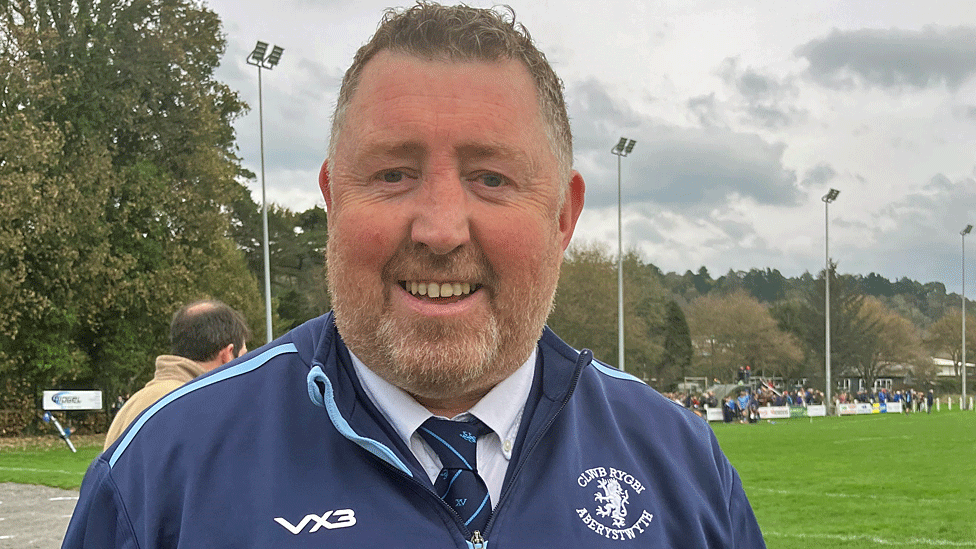
Aberystwyth RFC chairman Emlyn Jones worries young players who "chose to stay, work and play their rugby in England" may never return
That's a decision made by 17-year-old Keir Creasey, a talented back row, who said he's a huge Scarlets fan but who made the tough choice not to develop his rugby at the Welsh region, instead taking up "more opportunities" to study and play for Hartpury College in Gloucestershire.
"In a perfect world I'd like to stay in Wales but there are fewer opportunities here, even now," he said.
Keir said the cost and commitment to families of taking boys down to Llanelli to the Scarlets Academy meant that at least one of his friends had already switched to an English college.
He said the "pathway" for talented Welsh youngsters to develop and become stars of tomorrow would diminish if the number of Welsh professional teams, and subsequently youth academies, were cut by the WRU, so he may stay over the border and "see what happens".
WRU chairman Richard Collier-Keywood and director of rugby Dave Reddin defend criticism of Union's handling of regional restructuring
Heading east across the Bannau Brycheiniog - or Brecon Beacons - and the tough terrain of mid Wales, you drop down into the rugby heartlands of the Gwent Valleys.
They feel a long way from decisions being made in Cardiff about a sport which is as much treasured here as it is in the capital or in Welsh-speaking heartlands.
"It's all been a bit of a shambles to be honest," said Paul Tanner, chairman at Blaenavon RFC, based within sight of the old ironworks and Big Pit National Coal Museum.
Rugby too is very much woven into the fabric of this valley but Blaenavon Rugby Club has no intention of becoming another historical landmark.
"It's difficult to survive financially and we don't get much from the union," said Mr Tanner.
"We're thankful to sponsors, the generosity of parents and events we can put on at the club like guest speakers and bingo nights."
It is, indeed, all about numbers but the WRU has insisted it cannot afford to support four professional teams so it wants to fund three teams equally - that's £6.4m each, rising to £7.8m annually.
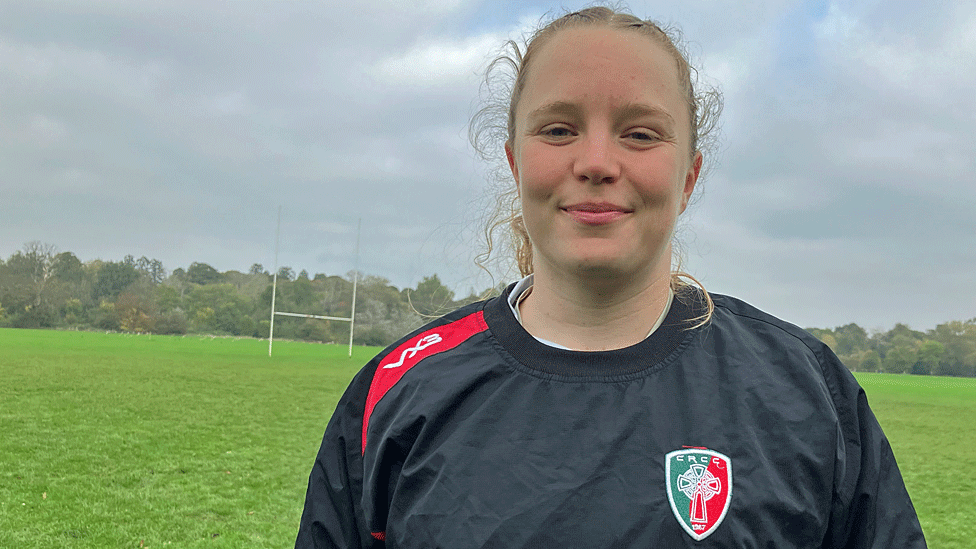
Player Laura Satterly: "It would definitely be a move in the right direction to link up with the men's squads"
At Blaenavon, they value their very close relationship with the Newport-based Dragons.
"Players from the Dragons come up the valley to run training camps and we're regular supporters down at Rodney Parade," said Mr Tanner.
He warned that if the WRU ever contemplated scrapping or downgrading the Dragons, it would haemorrhage support and goodwill across the region.
Like Mr Hopkins in Neath, Mr Tanner and his friends could never see themselves travelling to Cardiff to cheer a capital city-based super club.
"I'd rather go to Gloucester or Bristol," he said.
While a cut in the number of professional men's teams dominated Friday's announcement, major changes were also unveiled for women's domestic rugby.
As well as extra funding for the regional level teams - Brython Thunder and Gwalia Lightning - there will be a new four-club league, a national academy and player development centres.
One of the fastest growing women's sides is Cardiff-based Clwb Rygbi Cymry Caerdydd which has recently won cup honours at the Principality Stadium and now plays matches across the country, newly-promoted to the WRU Women's Premiership.
"There's a lot more coverage of the women's game so the idea of having two professional teams would be an improvement on what we have now," said Laura Satterly, a second row at the club.
"It would definitely be a move in the right direction to link up with the men's squads."
Scrum V
Join Lauren Salter and guests as they react to the findings of the WRU’s recent review and consultation into the future of elite game in Wales
25/10
Related topics
Related stories
- Attribution
- Published21 October
